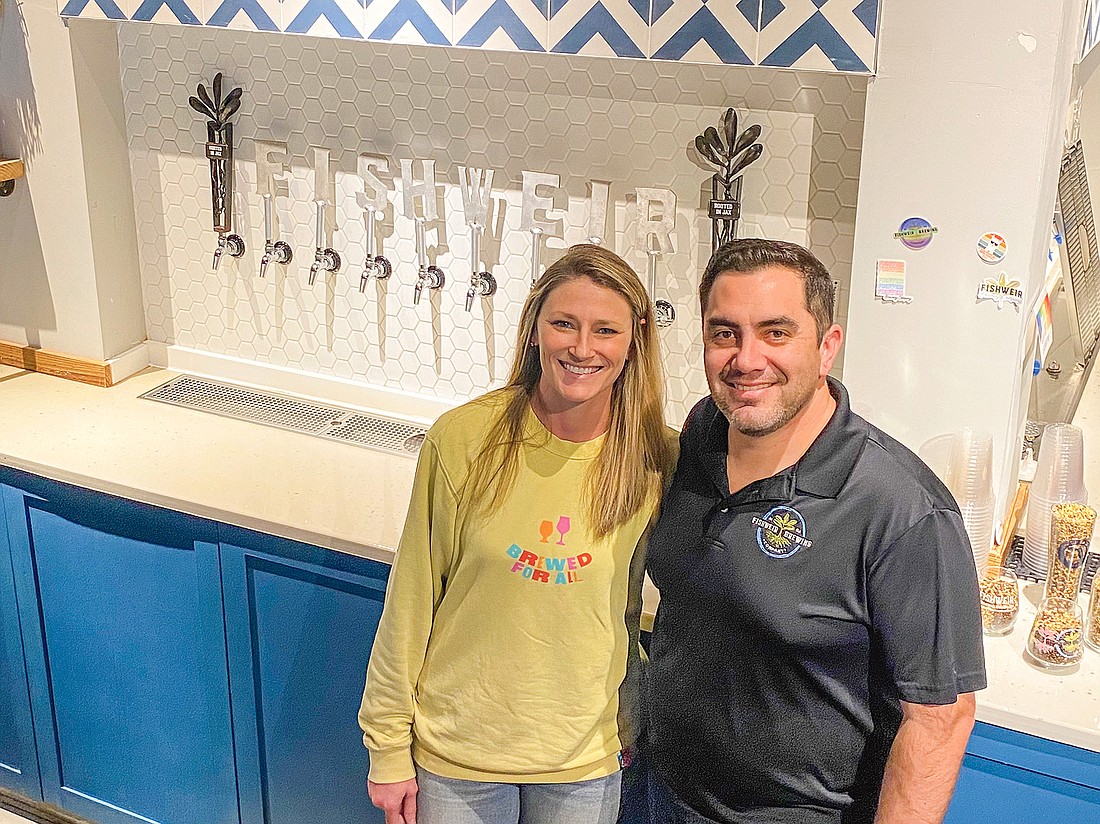
Fishweir Brewing Co. co-owners Stacey and Broc Flores will remember 2023 as a year of milestones for the Murray Hill brewery.
In November, Fishweir celebrated its fifth anniversary by rolling out five special brews with themed names like Cinco Mexican-style lager, 5our sour and Hop5 pale ale.
The anniversary came nine months after the couple adopted a tipless compensation system with a standard wage and benefits for the brewery’s staff.
“That was a big change for us,” Broc Flores said.
“It was important for us, because Stacey and I wanted to start a business that was community-focused and community-driven, and to do that you need to take care of the community that makes this place run.”
For all of the feel-good moments for Fishweir, 2023 also generated stiff economic headwinds for it and other small, independent breweries in Jacksonville and across the nation.
Inflation, spiking costs of doing business and shifts in consumer spending cut into revenue for independents, resulting in hundreds of American breweries shutting their doors in 2023.
While Fishweir has been able to weather the challenges by taking a conservative business approach and dialing back growth initiatives, others in Jacksonville called it quits.
Four local breweries have closed or have announced in recent months they are planning to: Tabula Rasa Brewing, in the Rail Yard District (August); Pinglehead Brewing Co. in Orange Park (November); Lemonstreet Brewing Co., also in the Rail Yard District (December); and Hyperion Brewing Co. in Springfield (closing in March).
Lemonstreet owner Joe Baez said his brewery succumbed to what might be described as a business version of long COVID.
The pandemic put Lemonstreet in a financial hole by sapping its working capital, he said, and inflation finished it off by triggering a 30% increase in his costs for utilities and supplies.
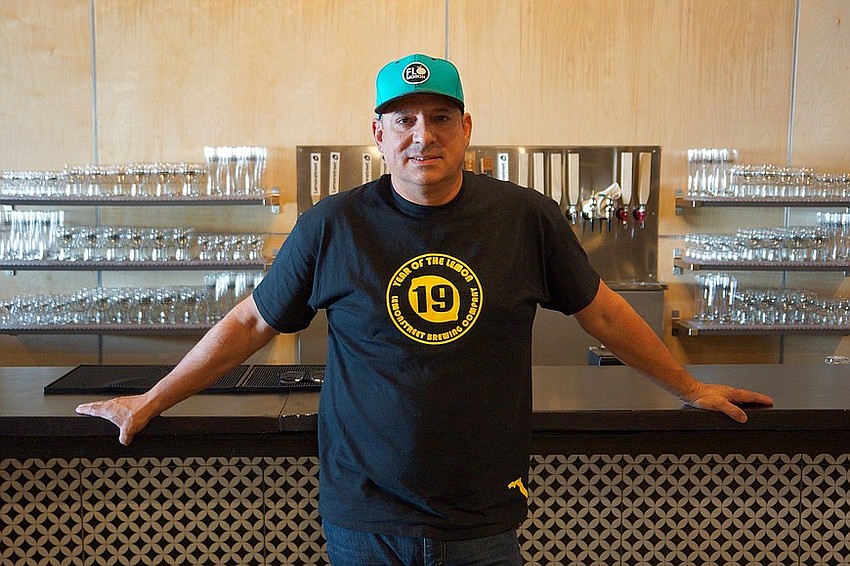
As he closed the brewery’s doors for the final time about four years after it opened, he said that without greater consumer support for local breweries in Jacksonville, “I think you’re going to see a wave of closures.”
Too many breweries, or not enough support?
The scenario Baez described is happening nationwide.
The Brewers Association, a not-for-profit organization representing nearly 6,000 U.S. breweries and 37,000 members of the American Homebrewers Association, reported that more than 385 breweries closed nationwide in 2023.
That’s the most that have gone under in recent years, including in 2020, when the pandemic hit.
For that, the Brewers Association partly blamed what it described in its annual report as increased “competition from across beverage alcohol” – think flavored alcoholic seltzers and canned cocktails – which can be consumed at home and have helped contribute to “declining draught sales and reduced shelf space for craft.”
Fishweir’s Broc Flores says national data also show that younger people are drinking less alcohol overall, possibly because of the increased availability of another intoxicant – legalized marijuana – or to better maintain their health.
Meanwhile, greater Jacksonville entered 2023 with at least 26 breweries in operation.
Asked whether he thought the area had become oversaturated with brewers and was destined for a correction, Flores said he thought there was less demand for craft beer in Jacksonville than in some other cities.
“I think the craft market is just small,” he said.
“I think that a lot of us who opened breweries when we did thought the craft scene would grow like it did in Charleston or Asheville and San Diego, etc., and it just never really did. It grew a little, but then it plateaued and just stuck there.”
Baez said he didn’t believe the closures were a matter of overcrowding, but instead were caused by a lack of support for independents among local beer drinkers. He said other communities support more breweries than Jacksonville on a per-capita basis and he pointed to Tampa as an example.
He’s right: Drink Local Florida, an online database of Florida breweries, lists more than 100 in the Tampa region.
Preben Olsen, co-owner of San Marco’s Aardwolf Brewing Co., said he believed there was still room for competition in Jacksonville.
“Market saturation? No,” he said.
“Breweries are still opening up, and a lot of the ones we see opening up have previous experience in the industry. So they are a little bit more wary of the pitfalls and the issues that they may run into.”
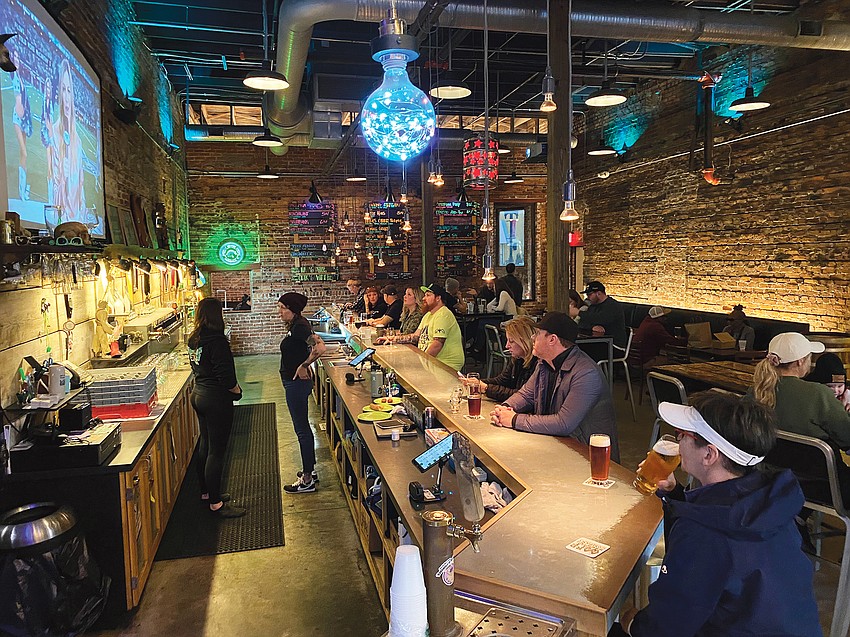
Indeed, new players have entered the picture.
The same month Tabula Rasa shut down, Myrtle Avenue Brewing opened less than 2 miles away.
In September, Pennsylvania-based Voodoo Brewing Co. announced it was planning to open a 8,646-square-foot bar and restaurant on San Marco Square, where it will sell products it brews at its home base.
Jekyll Brewing opened in May in Jacksonville Beach, and Grace Note Brewing launched its music-themed operation in Ortega in October.
In related developments, Mocama Beer Co. announced plans to expand beyond its home in Fernandina Beach by opening a taproom in Wildlight, and Springfield’s Strings Sports Brewery launched plans for a Jacksonville Beach expansion.
With the openings of new breweries, Jacksonville also followed a national trend. The Brewers Association reported that last year’s closures were more than balanced out by openings, with more than 420 brewers launching across the U.S.
The market sector remains lucrative for savvy operators, the organization said, with consumers spending about a quarter of their beer dollars at small and independent brewers.
For 2022, the last full year for which statistics were available, retail sales of craft beer were $28.4 billion.
Whether the upstarts are a healthy sign for the industry is a matter of debate.
Jim Vorel, the food and beverage editor for entertainment and culture Paste Magazine, wrote in November 2023 that many of the industry’s newcomers had “ignored the strident warnings of industry experts and analysts” by “elbowing their way into an oversaturated market with a seeming belief that they would be immune to the economic forces being faced by everyone else.”
Vorel wrote that the new breweries sapped business from established operations and left them vulnerable to market volatility.
“Everywhere they look, the customers they helped teach to drink ‘small and local’ are now doing exactly that … and it’s killing them.”
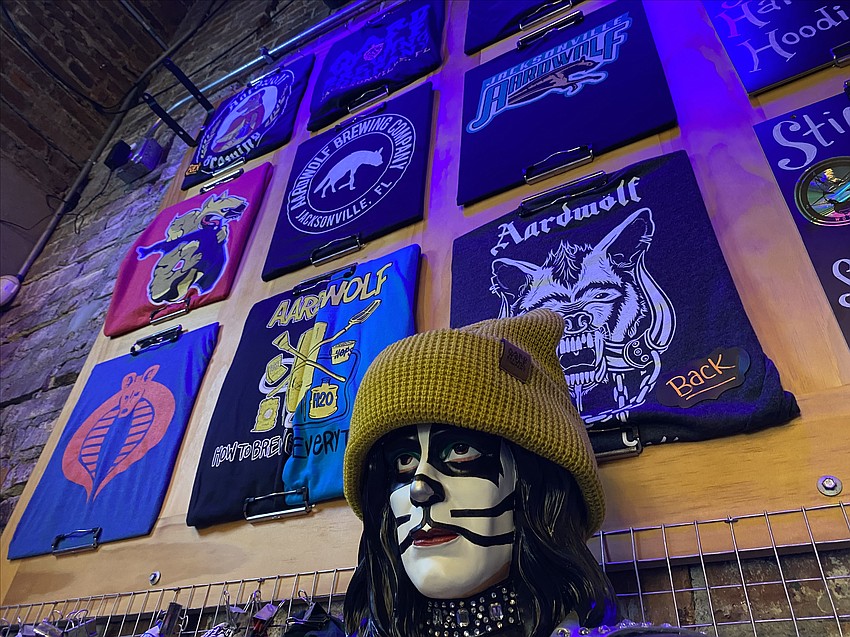
Aardwolf has been open since 2013, long enough to make it a mainstay among local breweries.
The challenges that Olsen and Aardwolf co-owner/head brewer Michael Payne have faced in the industry included solving the complexities of turning a nearly century-old ice plant into the brewery’s modern production facility and taproom at 1461 Hendricks Ave.
Then came the pandemic-related closures of 2020, followed by the supply chain issues and inflation.
Olsen, a former board member of the Florida Brewers Guild, also has watched the shifts in consumers’ tastes and spending habits that are pressuring breweries.
He describes brewers as being caught in a vicious circle of needing to raise the prices of their products to cover their higher costs, but realizing that those price increases may reduce demand among consumers who are tired of paying more for a full array of goods and services because of inflation.
“There has been a huge shift in market demand, with a larger number of people drinking at home,” he said. “Whether cutting back on the morning Starbucks or a pint at the pub once a week, we are all trying to save some money.”
Flores agreed that spending was flat, which he attributed partly to what he called “a little fatigue in the marketplace for craft beer.”
“I think for a while everybody was clamoring for (craft beer), and it was this big juggernaut growing 25-30% a year for a decade and a half,” he said.
“I think COVID was the burst of that bubble.”
The path forward
When Aardwolf opened its doors, there were relatively few craft brewers in Jacksonville.
Olsen, a self-described “beer geek” who tried home brewing but quickly discovered he would be better at running a brewery than making its beer, said other owners were willing to share information with upstarts like him.
He credits such individuals as Ben Davis, founder of Intuition Ale Works, and Brian and Susan Miller, the co-founders of Bold City Brewery, with helping him make a foothold in the industry.
Aardwolf has carved out its spot in the market by focusing on producing traditional European-style beers, such as its flagship Belgian Pale, but also experimenting with different types and adapting to the tastes of customers with products such as its Jag-Water hard seltzer.
Olsen said that although the number of breweries has increased substantially since Aardwolf opened, Jacksonville remains a market where brewers are willing to help each other refine their menus and products.
“We do talk amongst ourselves. What are you doing with your beer? What is selling? What is not selling? What are you adding to your beer specifically that people seem to be responding to? So there is a lot of collaboration,” he said.
For smaller breweries like his, Olsen offers this advice to deal with the current market: “Control your spending, pay down debt when possible, and slowly roll out any expansions while focusing on what you are good at/makes your brewery’s experience unique.”
That’s what the Fishweir team is doing.
The Floreses are focusing on their core business strategies, which include promoting game-day watch parties to fans of Florida State University, Stacey Flores’ alma mater, and holding other special events like an annual luau and a “splash pad” day when children can play in water inflatables on the brewery’s outdoor space.
These events have helped establish Fishweir, 1183 Edgewood Ave. S., as a go-to spot in Murray Hill for both big gatherings – FSU games draw as many as 300 people – and for smaller meet-ups involving groups like book clubs and the Murray Hill Preservation Association.
“I think there’s still room for us to exist and still be a successful small business,” Broc Flores said. “I just don’t think there’s room for us to grow like some breweries did 10 years ago and become a large regional powerhouse.”
That term could describe Intuition Ale Works, which has become the market leader in Jacksonville by distributing widely to major grocery stores, liquor stores and restaurants.
Since its founding in 2010, Intuition says it has become the fastest-growing brand of craft beer in Northeast Florida.
Reaching that level of success, especially in today’s climate, would require an investment beyond what many small or medium-sized independents could afford, Olsen said.
“As with many businesses, the joke is if you want to make a million dollars in the beer industry, be ready to spend two,” he said.
“So when you spend, say, $10,000 on a new fermenter you need to be ready to spend at least $20,000 in kegs to support that. It’s a hidden cost that is not always self-evident.
“There are a lot of things that make distribution hard. And then with the lower margins (compared to serving beer in-house), it’s a game that you’re going to play for pennies on the dollar.”
For Aardwolf and several other independents, distribution on a scaled level provides an important revenue stream.
Brewers say beer lovers can help support the local scene and encourage more competition by asking for their products at restaurants and bars, and urging those establishments to add more local beers to their menus.
Braving the headwinds
Stop into Fishweir on a late afternoon, and you’re apt to see a crowd that ranges from empty nesters to parents enjoying a beer or two while watching their young children romp around in the brewery’s outdoor space.
That’s by design, Flores said. A former Navy dentist who operates a practice not far from Jacksonville Naval Air Station, his service included a stint in San Diego, where he and Stacey enjoyed spending time in the revitalized neighborhood of North Park.
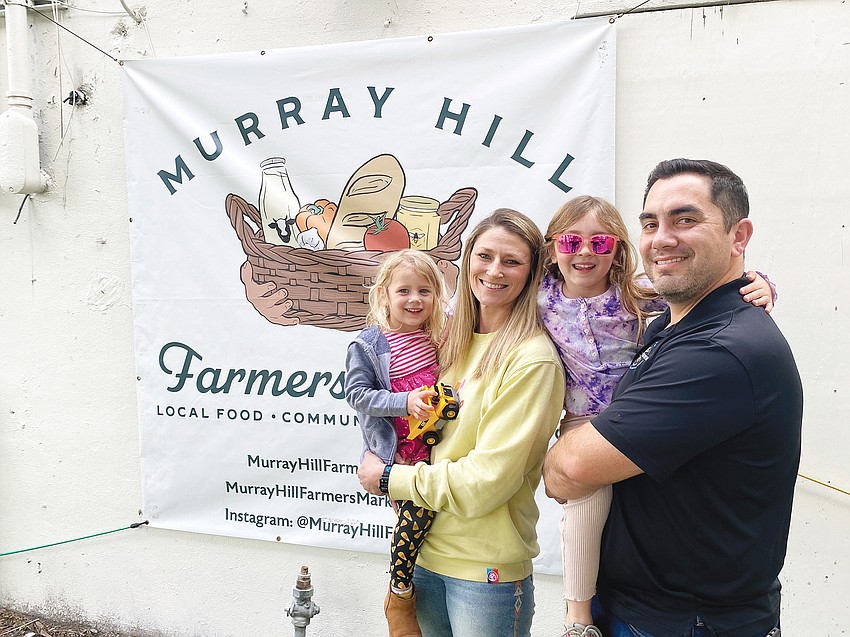
When Flores was assigned to Jacksonville and the couple moved here, the Floreses found Murray Hill similar to North Park – an area with small to medium-size, older homes well-suited for young families.
“When we opened the place, it was all about being a community-focused business,” he said.
“We wanted to be wholly and solely focused on building a community, and we think that through the families of this community, we’ve built that.”
Now, after making strategic investments in recent years that included construction of the outdoor space and adopting the new compensation model, the Floreses are planning to play things close to the vest in Fishweir’s sixth year while seeing how the current business challenges will play out.
“We’re in a position where we’re happy with what we’ve accomplished and there’s still more we want to do,” he said. “We’re just hoping that as people adjust to the new normal, we can continue to see new growth.”
As for the local market, he’s watching the lingering effects of inflation closely – and he’s worried about how smaller independents who operate on a narrow margin are going to survive.
“The multibillion-dollar corporations can absorb the higher costs,” Flores said.
“But the small, couple-million-dollar companies can’t. So I think there will continue to be quite a few closures, and you’re going to see a good number of middle-sized breweries that are going to start to really struggle, if they’re not already.”